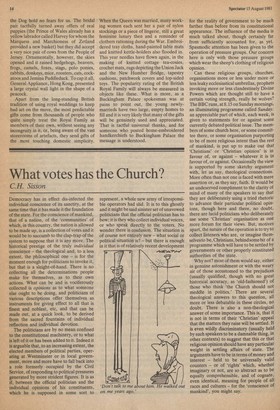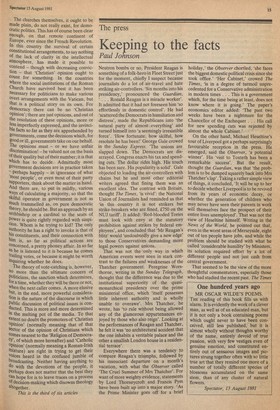What votes has the Church?
C.H. Sisson
Democracy has in effect dis-infected the individual conscience of its sanctity, at the same time that it has made it the foundation of the state. For the conscience of mankind, that of a nation, of the `communities' of which, in this country, the nation is allowed to be made up, is a collection of votes and it would be to succumb to the clap-trap of the system to suppose that it is any more. The historical prestige of the truly individual conscience — the theological and, to a less extent, the philosophical one — is for the moment enough for politicians to invoke it, but that is a sleight-of-hand. There is no collecting all the determinations people make for themselves, as to their own actions. What can be and is vociferously collected is opinions as to what someone else ought to be doing, and politicians of various descriptions offer themselves as instruments for giving effect to all that is finest and noblest, etc, and that can be made out, at a quick look, to be derived from the sacred fountains of individual reflection and individual devotion.
The politicians are by no mean confined to the constitutional machinery, or to what is left of it or has been added to it. Indeed it is arguable that, to an increasing extent, the elected members of political parties, operating at Westminster or in local government, more and more have to fall back into a role formerly occupied by the Civil Service, of responding to political pressures generated by more strident figures. It is as if, between the official politician and the individual opinions of his constituents, which he is supposed in some sort to represent, a whole new army of irresponsible operators had slid. It is to this ghostly and it might be said sinister set of unavowed politicians that the official politician has to bow; it is they who collect individual voices, or who speak directly to the voters. No wonder there is confusion. The situation is of course not entirely new — what social or political situation is? — but there is enough in it that is of relatively recent development 0 for the reality of government to be much farther than before from its constitutional appearance. The influence of the media is much talked about, though certainly far from sufficiently accounted for, as yet. Spasmodic attention has been given to the operation of pressure groups. Our concern here is only with those pressure groups which wear the sheep's clothing of religious opinion.
Can these religious groups, churches, organisations more or less under more or less leaky ecclesiastical umbrellas, prophets invoking more or less clandestinely Divine Powers which are thought still to have a certain voting strength, really be wolves? The BBC runs, at 8.15 on Sunday mornings, an illuminating programme called Sunday. an appreciable part of which, each week, is given to statements for or against some currently debated political issue. The members of some church here, or some committee there, or some organisation purporting to be of more religious intent than the rest of mankind, is put up to make out that `Christians' or `Christian opinion' is in favour of, or against — whatever it is in favour of, or against. Occasionally the view is supported by some sketchy argument with, let us say, theological connections. More often than not one is faced with mere assertion or, as they say, faith. It would be an undeserved compliment to the clarity of mind of many of the speakers to say that they are deliberately using a tried rhetoric to advance their particular political opinions, though here and there, no doubt, there are lucid politicians who deliberately use some 'Christian' organisation as one more forum for their views. But, motives apart, the nature of the operation is to try to collect listeners who are, or imagine themselves to be, Christians, behind some bit of a programme which will have to be settled by governments or other properly constituted authorities of the state.
Why not? most of them would say, either in genuine astonishment or with the weary air of those accustomed to the prejudices (usually qualified, though with no great historical accuracy, as 'old-fashioned') of those who think 'the Church should not meddle in politics.' There are several theological answers to this question, all more or less debatable in these circles, no doubt. There is also a non-theological answer of some importance. This is, that it is not in terms of their `Christian' appeal that the matters they raise will be settled. It is even wildly discriminatory (usually held by such speakers to be a damnable thing, in other contexts) to suggest that this or that religious opinion should have any particular weight in settling affairs of state. The arguments have to be in terms of money and interest — held to be universally valid counters — or of `rights' which, whether imaginary or not, are so abstract as to be equally comprehensible, and of cognate, even identical, meaning for people of all races and cultures — for the `conscience of mankind', you might say. The churches themselves, it ought to be made plain, do not really exist, for democratic politics. This has of course been clear enough, on that remote continent of Europe, ever since the French Revolution. In this country the survival of certain constitutional arrangements, to say nothing of the lack of clarity in the intellectual atmosphere, has made it possible to contend — though with decreasing conviction — that 'Christian' opinion ought to count for something. In the countries Where the social institutions of the Roman Church have survived best it has been necessary for politicians to make various overt arrangements with the Vatican, but that is a political story on its own. For democracy there can be no 'Christian Opinion'; there are just opinions, and out of the resolution of these opinions, more or less imperfectly expressed, and the invincible facts so far as they are apprehended by governments, come the decisions which, for good or ill, governments take on our behalf. The opinions must — or we have unfair discrimination! — be valued not on the basis of their quality but of their number; it is that Which has to decide. Admittedly most government decisions are in practice taken 7 perhaps happily — in ignorance of what most people', or even most of their party supporters, think about the matter in hand. And there are, to put in mildly, various ways of calculating a majority, so that the skilful operator in government is not as much trammelled as, on pure democratic theory, he should be. But an approach by an archbishop or a cardinal to the seats of Power is quite rightly regarded with suspicion. Whom is he trying to kid? The only authority he has a right to invoke is that of his constituents, and their connection with him is, so far as political actions are concerned, a pretty phoney affair. In so far as he is listened to it is because he comes !railing votes, or because it might be worth inquiring whether he does. The theory of vote-catching is, however, no more than the ultimate concern of Politicians, the sanction which determines, bra time, whether they will be there or not, When the next caller comes. A more elusive but, in the end, more powerful consideration is the nature of the discourse in which Public discussion of political issues is conIticted. This is more and more determined in the melting pot of the media. To that extent no doubt the promoters of 'Christian Opinion' (normally meaning that of that sector of the opinion of Christians which comes nearest to the 'Religion of Democracy', of which more hereafter) and 'Catholic °Pinion' (normally meaning a Roman-Irish Mixture) are right in trying to get their voices heard in the confused jumble of broadcasting. Neither having anything to do with the devotions of the people, it Perhaps does not matter that the best they can hope for is to leave traces on a process of decision-making which disowns theology altogether.
This is the third of six articles



































 Previous page
Previous page